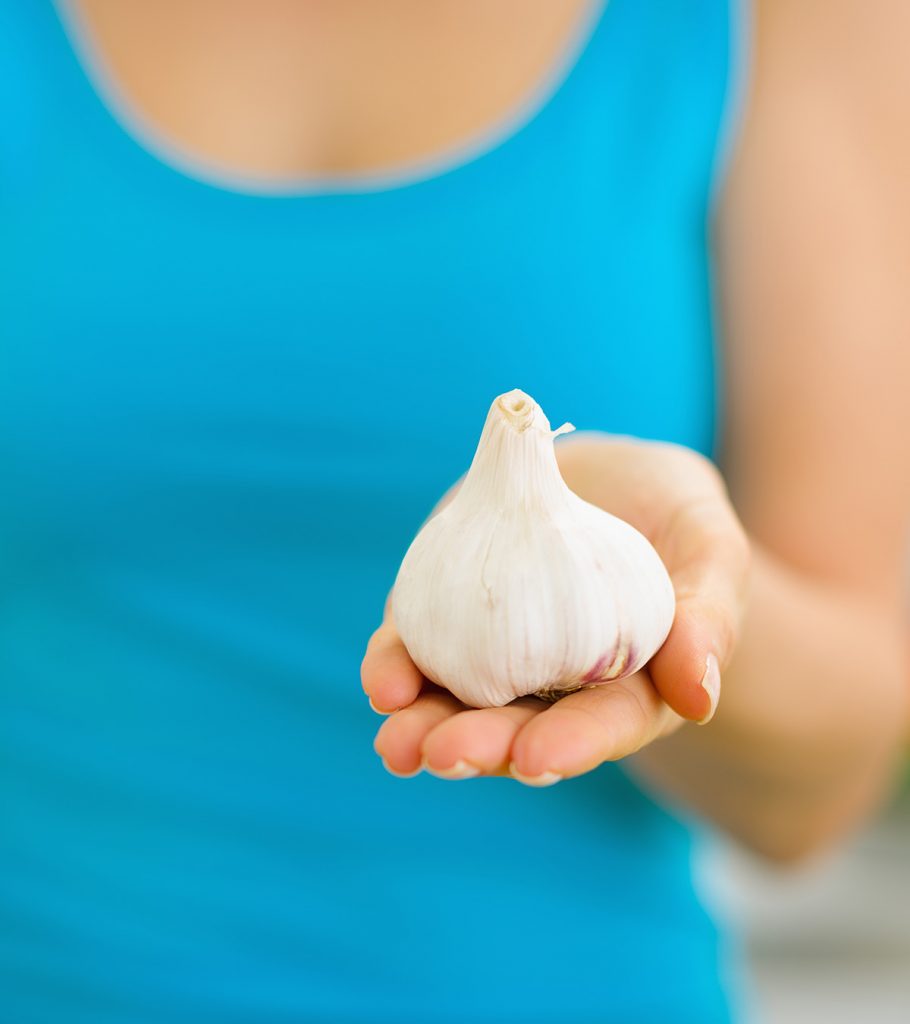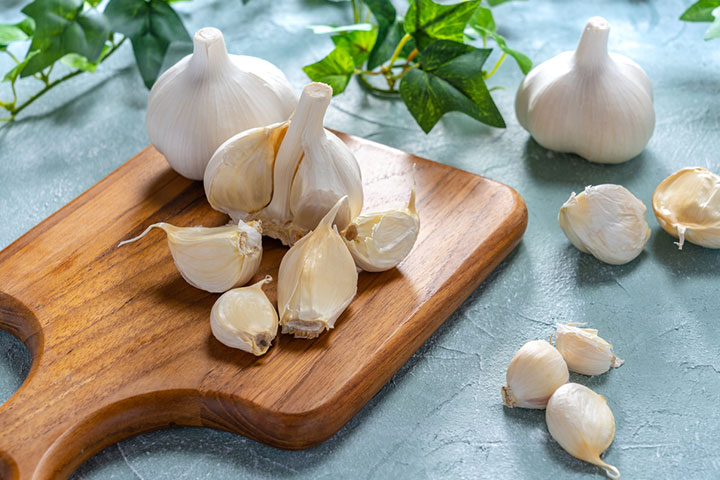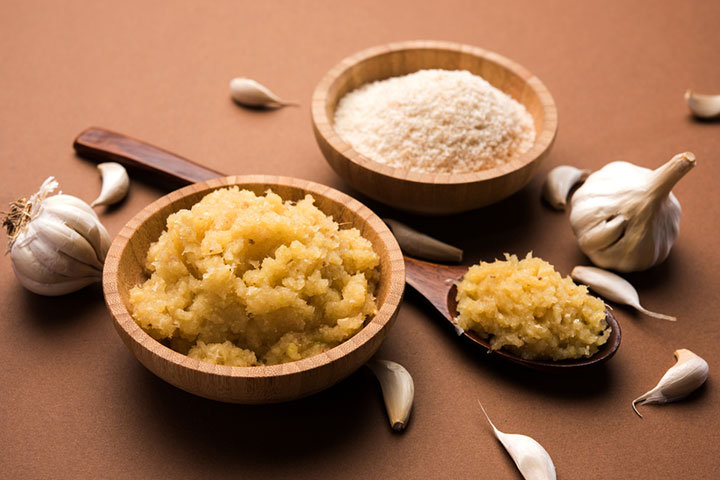Garlic (Allium sativum) is a common kitchen ingredient known worldwide for its peculiar aroma and pungent taste. Besides adding flavor to food, it possesses certain medicinal properties that benefit health. Several mothers consume garlic when breastfeeding to reap its lactogeniciXA property of inducing or triggering the production of breast milk effects. But is garlic safe for lactating mothers?
Does its ingestion help increase breast milk supply or affect breast milk composition and milk quality? We answer all your queries and tell you more about the possible health benefits of garlic for nursing mothers, its side effects, and ways to include garlic in your breastfeeding diet.
Is Garlic Safe For Lactating Mothers?
The US Food and Drug Administration (FDA) has categorized garlic as GRAS (generally recognized as safe) during lactation (1). Therefore, you can use garlic in your diet regularly in moderate amounts.
- However, stay cautious if your baby is known to be allergic to other edible plants from the Allium genus, such as onions, shallots, leeks, and chives (2).
- Additionally, it is important to consider garlic’s safety when consuming it. For instance, you should avoid garlic if you are on certain medications, such as anticoagulantsiXA substance or drug that prevents the clotting of blood and reduces the risk of heart attacks and strokes, and in case you experience symptoms of food intolerance after garlic ingestion.
- If you are planning to use garlic supplements or garlic pills that contain raw garlic or garlic extracts for any therapeutic purpose, then seek advice from your healthcare provider before using them because supplements may not have sufficient clinical trials to test their safety and efficacy (3).
Does Garlic Help Increase Breast Milk?
The use of garlic as a galactagogue is prevalent across cultures. However, there are no targeted research studies to support (1). Some studies show that garlic can change the taste and odor of breast milk. Babies, who like the taste, may have an increased breastfeeding time and thus might eventually have a positive impact on breast milk production and milk volume (4).
However, if the baby does not like the taste and odor of the milk on the day when you consumed garlic, they might refuse to feed (5).
What Are The Possible Health Benefits Of Garlic For Nursing Moms?
In terms of garlic’s benefits, research has suggested that garlic may have positive effects on maternal nutrition. The use of garlic for therapeutic and medicinal purposes is well-documented in alternative medicine. Benefits are usually attributed to the presence of diverse bioactive compounds such as organic sulfides, saponins, phenolic compounds, and polysaccharidesiXLong chains of naturally found carbohydrates that store energy, send cellular messages, and act as structural components of cells (6) that exhibit anti-inflammatory, antimicrobial, antioxidant, and anti-cancer effects (7) in the long run.
- Might help in weight loss: Some studies show that consuming garlic in its fermented form might help in weight loss. When made a part of a well-balanced diet, garlic could inhibit lipogenesis and regulate lipid metabolism (6).
- Maintain a healthy gut: Garlic might support gut health through its prebioticiXCompounds that improve overall health by acting as food for the good bacteria present in the human gut and antibacterial properties. The prebiotic effect of garlic is attributed to the presence of fructans, a non-digestible polysaccharide, while the antibacterial properties are attributed to the presence of organosulfur compoundsiXOrganic compounds containing sulfur that impart strong odors to certain foods, including garlic such as allicin (8).
- Anti-cholesterol effect: Consuming garlic for cholesterol management has been shown to be beneficial. Scientific evidence suggests that consuming approximately half to one clove of garlic per day resulted in an average reduction of around 9% in total serum cholesterol levels among the studied patient groups (9). Additionally, supplementing with Aged Garlic Extract (AGE) in animal diets showed a similar effect, reducing plasma concentrations of total cholesterol and triacylglycerol by 15% and 30%, respectively. Although the exact mechanism is not fully understood, scientific observations suggest that certain compounds in garlic, both hydrophilic and hydrophobic, may inhibit cholesterol synthesis (10).
- Heart health: In addition to being anti-atherosclerotic, garlic may also protect from other heart-related issues such as myocardial infarction. Animal studies have shown that garlic has the potential to protect the heart from oxidative damage (11). Hence, consuming garlic for heart health may also be beneficial.
- May enhance immunity: Fructans have the potential to boost the probiotic effect in the gut, thus, in turn, causing positive immunomodulatoryiXSubstances that regulate immune system functions to combat diseases and infections. effects (12).
- Anti-inflammatory effect: Inflammation associated with breastfeeding can lead to conditions such as sore nipples and mastitisiXInfection in the breast tissues usually caused by bacteria or blocked milk ducts leading to pain and inflammation while breastfeeding. Anecdotal evidence suggests that garlic has potential anti-inflammatory properties that may provide some relief from the condition.
- Useful antimicrobial properties: Thrush, a fungal or yeast infection, is common in nursing babies and mothers. Oral thrush in babies can cause irritation in the mouth and throat, making it difficult to breastfeed. In traditional medicine, raw garlic is used to help lactating mothers prevent or reduce the yeast infection, reduce the irritation, lower the nipple pain, and help the baby breastfeed comfortably.
- Antioxidant effect: Garlic and its extracts have antioxidant properties that may be helpful in combating free radical damage and provide protection against several diseases (13).
- Potential anti-diabetic effect: Animal-based research studies show that garlic extract is effective in maintaining blood sugar by reducing insulin resistance. It is mainly attributed to the presence of volatile sulfur compounds, such as alliin, allicin, allyl methyl sulfide, etc. (3). However, more research is needed to affirm this in humans.
- Cardioprotective effects: Both animal and human studies show that raw garlic consumption lowers blood pressure and thus has potent cardioprotective effects due to the presence of allicin (or diallyl thiosulfinate) (14).
Garlic is also traditionally used for the treatment of arthritisiXAn inflammatory condition characterized by swelling, stiffness, and pain in the joints, toothache, chronic cough, constipation, and infectious diseases (as an antibiotic) (3).
What Are The Side Effects Of Garlic When Breastfeeding?
Garlic consumption during maternity, in general, is safe. However, some side effects of garlic that may occur in specific conditions are given below (15).
- Colic: Garlic in excess is to induce gas. Thus, its maternal consumption is often associated with coliciXPeriodic and predictable crying episodes in infants for an extended period with no definitive cause in the baby. Though there are not many clinical studies, it is observed that some babies become fussy and irritable when their mothers eat garlic.
- Drug interaction:A nursing mother on blood thinners must consult a doctor before consuming garlic since it has anti-platelet effects. In some cases, this may lead to bleeding and other related complications (16).
- Gastrointestinal issues: Some studies revealed that eating garlic in excess may lead to issues such as acidity, indigestion, nausea, vomiting, body odor, diarrhea, and gas formation. A very high intake of garlic might lead to liver damage, as well (17).
The moderate use of garlic in your breastfeeding diet may mitigate the above-mentioned garlic’s side effects.
How To Include Garlic In Your Breastfeeding Diet?
Garlic bulbs are versatile and can be used fresh, as essential garlic oil, macerated garlic oil, garlic powder, and aged garlic extract.
- A breastfeeding mother can add fresh garlic cloves (crushed) to savory rice recipes, or you can add them to soups. If you are using fresh, raw garlic, then use them crushed as it will release the bioactive compounds.
- You can also use garlic powder in salads and grilled dishes like tofu and chicken.
- Grated garlic mixed in olive oil can be an excellent low-calorie sandwich base.
- Garlic paste can be used to prepare a sauce.
- Fermented garlic is also an option to try. It will not only enhance food flavors but also provide health benefits.
Garlic has been considered a fairly safe food for lactation. However, it is important to be mindful of any dietary restrictions you may have when incorporating them into your meals. In many cultures, women consume garlic when breastfeeding because it is considered a galactagogueiXA food, supplement, or medication that aids in enhancing breast milk production. However, since clinical studies on garlic are sparse, you should consult a doctor before consuming it in diet or supplement form. Monitor your baby’s reaction closely after you consume garlic; some may like the taste of the milk and increase feeding, while others may not like it and refuse to feed. Also, some babies may experience colic and other kinds of discomfort if you eat garlic. In such cases, consult a doctor for advice.
Key Pointers
- According to the FDA, garlic is safe to be consumed (in moderation) by breastfeeding mothers.
- Consumption of garlic helps maintain a healthy weight and boosts digestion and immunity.
- Garlic is also known for its anti-inflammatory, antimicrobial, and antioxidant properties.
- Nursing mothers should watch out for signs of garlic allergy in their babies to avoid complications.
- Excessive consumption of garlic while nursing may induce drug interactions and digestive issues in the mother and colic in babies.















